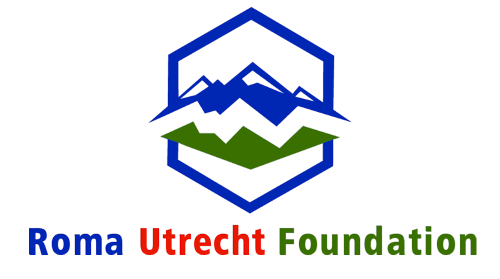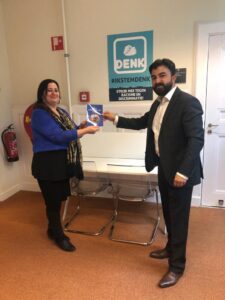CALL FOR APPLICATIONS
Analysis of bottom-up approaches to Roma inclusion and funding programs
The European Roma Grassroots Organizations (ERGO) Network is contracting external consultants to prepare a study consisting of the following two parts:
- Study on importance of bottom-up approaches to Roma inclusion
- Analysis of current funding programs on Roma inclusion in Europe
ERGO Network brings together over 30 members from across Europe and supports organisations with a common perspective on Roma grassroots empowerment and equal citizenship to challenge stereotypes and combat stigmatization. We mobilize and connect organisations and individuals that share and express our values – active citizenship, shared responsibility, and passion – to strengthen and empower Roma civil society involvement in decision-making at local, national and European level and to address existing shortcomings of policies targeted at Roma.
Role of the consultant
Through the ”New solutions to old problems – exchange of new types of approaches in the field of Roma integration” project, funded by Iceland, Liechtenstein and Norway through the EEA and Norway Grants Fund for Regional Cooperation, ERGO Network is contracting an external expert to
- Analyze programs supporting Roma inclusion that use bottom-up and community development schemes and
- Analyze existing top-down funding programs for Roma inclusion, their benefits, and pitfalls. Specifically, the consultant is expected to prepare two reports of approximately up to 25 pages each, in English, with conclusions and concrete recommendations for improvement of funding programs.
First drafts should be delivered by 31 July 2021 and final reports by 31 August 2021. Both studies can be conducted by same consultant.
Profile of the consultant
- A consultant can be an individual, institution or organization.
- Proven knowledge about Roma inclusion policies
- Experience working with Roma civil society.
- Excellent writing skills
- Proven research and analytical skills
- Ability to work independently.
Contract and budget
The independent consultant will be subcontracted by ERGO Network and has no rights vis-à-vis the EEA and Norway Grants for Regional Cooperation. He/She reports to ERGO Network. Each of the two reports will be renumerated with 2000 €, VAT and all costs and charges included.
Aims of the Study on importance of funding bottom-up approaches to Roma inclusion
- To analyse challenges and advantages of top-down and bottom-up funding programs and approaches used by different donors in Europe.
- To raise awareness among (Roma) civil society and donors on the importance of investing in local level initiatives that are participatory and led by Roma civil society.
- To provide recommendations to private donors, governments, and international institutions on the design of funding programmes targeting Roma inclusion and empowerment, to further promote the bottom-up approach and community participation.
Aims of the Analysis of funding programs on Roma inclusion
- To give an overview of current funding programs for Roma inclusion of institutional and private donors in Europe, and their type of approach (top-down or bottom-up)
- To raise awareness of private donors on the importance of investing in Roma inclusion and empowerment.
- To showcase examples of funding that could contribute to capacity building for a better use of funds.
- To identify barriers and success stories of bottom-up approaches in addressing the needs of Roma
- To provide recommendations to private donors, governments, and international institutions on the design of funding programmes targeting Roma inclusion and empowerment
- To provide Roma and pro-Roma civil society organizations with tips and information on the how to reach donors.
The applicants should submit:
- An updated CV
- Recent history of published research and links to the publications
- A proposal for the structure of the study/studies – possible content, research question and methodology
The application package should be submitted by 5 May 2021 to info@ergonetwork.org with the subject – name of the study you are applying for.




 Utrecht Foundation & the Roma Advocacy Network Netherlands, we have been working for almost for 20 years as volunteer activists from the Roma grassroots level. In October 2020 a motion by Selçuk Öztürk on antigypsyism and how to combat this injustice has been adopted by the majority of the Dutch National Parliament.
Utrecht Foundation & the Roma Advocacy Network Netherlands, we have been working for almost for 20 years as volunteer activists from the Roma grassroots level. In October 2020 a motion by Selçuk Öztürk on antigypsyism and how to combat this injustice has been adopted by the majority of the Dutch National Parliament.
 face economic and social inequalities and live in a position particularly vulnerable to violence and discrimination. Compared to most women in the Czech society, these women are often at higher risk of social exclusion, live under worse material conditions, and have a lower quality of life. The problems of these women are often overlooked, which is why the Invisible Power coalition, with the support of the German EVZ Foundation, was founded—to give these women space to be seen and heard. The coalition represents a collaborative effort of the Czech Women’s Lobby (CWL) and its member organizations Association for Integration and Migration (SIMI) and SLOVO 21, under which the Roma women’s group Manushe operates.
face economic and social inequalities and live in a position particularly vulnerable to violence and discrimination. Compared to most women in the Czech society, these women are often at higher risk of social exclusion, live under worse material conditions, and have a lower quality of life. The problems of these women are often overlooked, which is why the Invisible Power coalition, with the support of the German EVZ Foundation, was founded—to give these women space to be seen and heard. The coalition represents a collaborative effort of the Czech Women’s Lobby (CWL) and its member organizations Association for Integration and Migration (SIMI) and SLOVO 21, under which the Roma women’s group Manushe operates.
 The employee expects 8 half-day theoretical trainings and 16 half-day practical workshops (2 trainings and 4 workshops in each locality) in the field of advocacy activities. The participants will then be permanently supported by experts in the form of tailor-made consultations.
The employee expects 8 half-day theoretical trainings and 16 half-day practical workshops (2 trainings and 4 workshops in each locality) in the field of advocacy activities. The participants will then be permanently supported by experts in the form of tailor-made consultations.